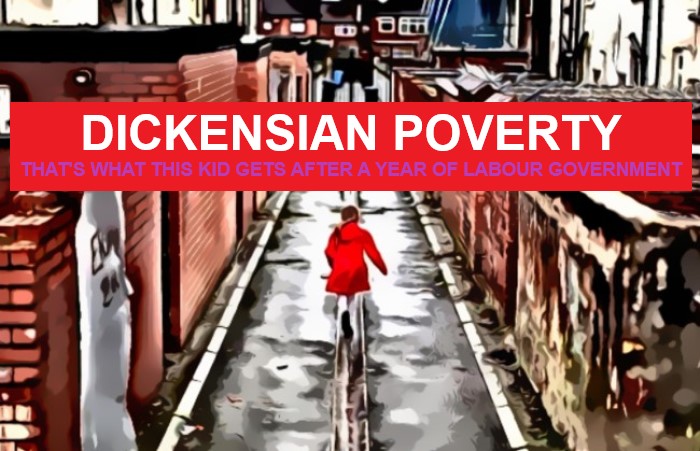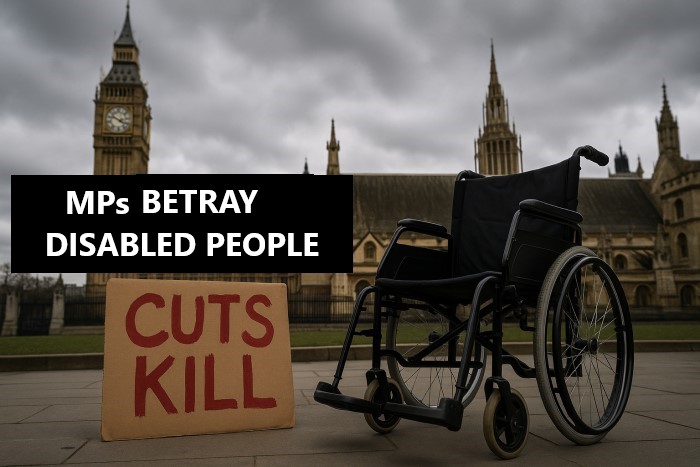Labour’s silence on benefit cap betrays children living in “Dickensian” poverty

Share this post:
So much for the “change” we were promised.
More than a year since Labour swept into Downing Street on promises of “change,” one thing is crystal clear: for Britain’s poorest families, nothing has changed at all.
This week, the Children’s Commissioner for England released a devastating report that should shame everybody in power.
It reveals that children across the country are now living in conditions described as “almost-Dickensian”. Not metaphorically—literally.
Think black mould in bedrooms. Rats in kitchens. No heating. No food. No privacy. Children sleeping three to a bed, skipping meals, and calling bacon a “luxury.”
This is the United Kingdom in 2025. Not the 19th century. Not some dystopian novel. Real lives. Real kids. Real poverty.
The scale of the crisis is jaw-dropping. A record 4.45 million children are now living in poverty across the UK. But it’s the cause—and Labour’s refusal to fix it—that’s the real scandal.
The two-child benefit cap: still here, still harming
At the centre of this crisis is a single, cruel policy: the two-child benefit cap, imposed by the Conservatives in 2017 and left firmly in place by Labour in 2024, despite widespread condemnation from experts, charities, and even Labour’s own backbenchers.
The rule prevents families from claiming support through Universal Credit or Child Tax Credit for any child after the second. No matter the circumstances. No matter the hardship.
The impact? 350,000 children could be lifted out of poverty overnight if the cap were scrapped. Instead, the government allows 109 more children to be pushed into poverty every single day it remains in force.
It’s a policy that punishes children for existing—and one that Labour has had more than a year to scrap, but hasn’t.
Labour’s excuses are wearing thin
In a BBC interview last week, Education Secretary Bridget Phillipson dodged questions about removing the cap, saying recent welfare decisions have made spending “harder.”
This is the same Labour government that has:
-
Taken pride in prioritising “fiscal discipline” over moral duty.
-
Failed on major welfare reforms, preferring to inflict cuts rather than offer aid.
-
Dodged any serious commitment to redistribution or systemic change.
If it won’t act now—with a majority in Parliament and a public desperate for change—when will it?
Let’s be blunt: keeping the two-child limit is not a necessity. It’s a choice. A choice to balance the books on the backs of poor children. A choice that says some kids simply don’t count—especially if they’re born into families the government deems “too large” or “undeserving.”
“They talk about rats.”
Dame Rachel de Souza, the Children’s Commissioner, put it best: these children don’t talk about “poverty” as an abstract concept. They talk about the cold, about the mould, about their parents crying, about not having anywhere to do homework, or even a private place to wash.
This is not about politics anymore. It’s about basic dignity, humanity, and whether we allow an entire generation to grow up in shame and squalor because neither the Conservatives nor Labour have the backbone to do the right thing.
Yes, Labour has introduced a crisis fund and expanded free breakfast clubs—but those measures barely scratch the surface. They are firefighting, not fixing.
A real child poverty strategy would start by scrapping the two-child cap. Instead, Labour is “reviewing” it—while the suffering continues.
How “change” really looks
Labour didn’t campaign to prolong the Tory war on welfare. Its candidates campaigned on fairness. On compassion. On rebuilding broken Britain.
Yet more than a year into Starmer’s government, child poverty is worse than ever, and one of the most vicious austerity policies of the last decade is still standing.
If Labour won’t scrap the two-child limit, then let’s stop pretending we’re living through an era of change.
For millions of kids, it’s the same old story: ignored, punished, forgotten.
Share this post:
Government abandons postcode lottery plan for electricity bills
In a rare welcome move, the UK government has dropped plans to turn electricity pricing into a postcode lottery.
The proposal, known as zonal pricing, would have meant people paid different amounts for their electricity depending on where they live — regardless of their usage, income, or ability to absorb rising costs.
It’s a policy that rightly caused outrage, and now it has been scrapped.
But let’s not rush to hand out praise without first examining how we got here — and how long it took.
This was not a swift policy rethink – it was the result of three long years of dithering, spanning two governments: two years of inaction and quiet planning under the Conservatives, followed by a further year of indecision under Labour.
The original proposal emerged as part of discussions around reforming the electricity market to encourage cleaner, cheaper, and more localised energy.
In theory, zonal pricing could have meant cheaper bills for areas like Scotland, which produce more renewable electricity than they consume.
But in practice, it would have created a divided energy system, penalising people in urban and less energy-rich regions, including many in England and Wales.
A postcode lottery, plain and simple
Critics were quick to label it a “postcode lottery” — and rightly so.
Under the scheme, someone living in rural Aberdeenshire could have paid significantly less than someone in inner-city Birmingham or Liverpool, based purely on proximity to a wind farm or solar array.
Worse still, this wasn’t some fringe idea, quietly shelved.
The Conservative government spent two years consulting, reviewing, and floating the idea, while doing little to communicate the risks to the public.
Then, under Labour, Energy Secretary Ed Miliband picked up the baton, saying in April that zonal pricing was still “on the table.”
Let’s be clear: Ed Miliband did say his priority was to bring down bills for everyone — but the very fact that zonal pricing was being seriously considered until this month – July 2025 – after three years of public concern and industry warnings, is a sign of how disconnected our energy policy debate has become from the people it is meant to serve.
Industry warning signs
Even the energy industry, often more concerned with profit than public interest, raised alarms.
Companies like SSE warned that zonal pricing would create “added risk” and destabilise investment in renewables.
Energy UK, the body representing the energy sector, welcomed the government’s decision to walk away from the idea, clearly relieved that the uncertainty has finally ended.
Others, like Octopus Energy, remained supportive, arguing zonal pricing could cut bills by around £100 per year for many households.
But even that figure is questionable, and comes with significant regional disparities and economic consequences that would disproportionately affect low-income areas.
Clarity is not resolution
In the end, the government opted to stick with a national pricing system — a decision that avoids a dangerous precedent but doesn’t fix the deeper issues in the electricity market.
As Kate Mulvany from Cornwall Insight rightly put it: “Clarity is not the same as resolution.”
The national system itself is flawed.
It sets prices based on the highest-cost electricity being generated at any given moment, which drives up bills unnecessarily.
Reform is still needed — but reform that focuses on fairness, transparency, and reducing household costs for everyone, not just those lucky enough to live near a wind turbine.
Political credit — and accountability
So, yes — credit to the government for eventually doing the right thing.
But don’t let them pat themselves on the back too hard.
This policy should never have been on the table in the first place, and the three years it hung around — causing uncertainty for households, investors, and the industry alike — are three years of avoidable delay and distraction.
Let’s not forget that it was the Conservatives who let this idea fester, and Labour who failed to kill it quickly when given the chance.
The end of the postcode lottery is a victory — but a messy, belated one.
Now the real work must begin.
The energy system is broken.
Bills are still too high.
Investment is too risky.
And market reform must come with one unshakable principle: fairness for all — no matter where you live.
Disabled people betrayed as MPs hand government blank cheque for welfare cuts

Share this post:
MPs have voted to pass the Universal Credit Bill — stripped of all meaningful safeguards and loaded with powers that may devastate the lives of sick and disabled people from 2026 onwards.
It may go down as one of the most brazen acts of political cowardice in recent memory,
Despite weeks of debate and dozens of amendments, Parliament failed to prevent the government from doing exactly what it originally intended: delay the cuts, dress them up as “reform”, and implement them at will — even if the long-promised Timms review advises against it.
The final vote saw the Bill pass by 336 votes to 242, effectively greenlighting a two-tier welfare system and leaving future claimants exposed to the same cuts MPs claimed to oppose just last week.
MPs knew the danger — and let it happen anyway
The Government’s original plan – to slash support for people with long-term health conditions and disabilities – was partially paused after a rebellion by Labour backbenchers during the Bill’s Second Reading on July 1.
Ministers promised that any changes to Personal Independence Payment (PIP) would wait for a review — the so-called Timms review, set to report in autumn 2026.
But there is no legal obligation for the government to follow the review’s findings – or even debate them, let alone have a vote.
And yesterday, when MPs had the chance to change that — they refused.
New Clause 8, tabled by John McDonnell, would have blocked the Government from using secondary legislation to impose PIP cuts.
It would have forced ministers to publish draft legislation and bring any changes before Parliament for full scrutiny.
And it was defeated by 443 votes to 130.
This was the only amendment that would have made it legally impossible for the government to ignore the review and press ahead with cuts anyway.
‘Meaningful engagement’ means nothing without power
Labour MP Marie Tidball tabled New Clause 11, calling for the review to be genuinely “co-produced” with disabled people and led by those with lived experience.
Sir Stephen Timms, the minister conducting the review, accepted parts of her proposal and promised to work closely with disability groups.
But he refused to guarantee them a veto. And despite appeals from MPs like Stella Creasy, he declined to give them any binding influence at all.
“We will aim for a consensus,”
Timms said from the despatch box.
That is not co-production.
That is consultation with extra steps.
If the Government doesn’t like what disabled people say, ministers can ignore it — just as they have ignored the United Nations, the disability charities, and the thousands of sick and disabled people warning that these cuts will cost lives.
Cuts delayed, not defeated
The only “concession” made was on timing.
The cuts to PIP have been deferred — not scrapped.
Cuts to the Universal Credit health element for new claimants will begin in April 2026, as originally planned.
-
People diagnosed with cancer or MS after that date will receive up to £50 less per week than those diagnosed earlier.
-
Fluctuating conditions like ME, epilepsy or bipolar disorder will be penalised, because the Bill legally requires conditions to affect people “constantly”.
-
Attempts to fix that — including Amendment 38, which would have protected people whose condition worsens or relapses — were voted down.
All of this could have been stopped.
MPs were given the tools.
They chose not to use them.
BBC spins, MPs capitulate, disabled people pay
Meanwhile, mainstream media outlets like the BBC laundered the truth, reporting that the Government had “backed down” and “protected existing claimants” — as though that were enough.
There was no mention of the fact that the Timms review has no legal force.
There was no mention that Parliament voted against binding the Government to it.
There was no mention that the exact same cuts could still arrive in 2026, exactly as planned.
The Government got what it wanted, wrapped in the PR-friendly veneer of consultation and review.
Future disabled people will pay the price.
And Parliament will pretend it didn’t know.
But it did know.
MPs knew the dangers.
They debated them.
They named them.
Then they voted to expose disabled people to them anyway.
Share this post:
Fool’s Gold: how Farage’s immigration rhetoric can be exposed for what it is

Share this post:
When a former Treasury adviser and lifelong macroeconomist like Simon Wren-Lewis says Labour isn’t just failing in policy but in political strategy, it’s worth paying attention.
His latest Mainly Macro post identifies three grave mistakes Labour has made in its first year: underestimating the fiscal crisis, parroting Farage on immigration, and refusing to tell the truth about Brexit.
But one phrase in particular jumped out at This Writer: fool’s gold.
Farage’s immigration message, Professor Wren-Lewis argues, is just that.
A shimmering promise that collapses under scrutiny.
If Labour won’t challenge it, someone else must.
‘Fool’s Gold’ politics
Labour’s current tactic—to echo Farage’s tone while claiming more competence—has backfired.
Rather than neutralising Reform UK’s rise, it has amplified it.
Prof Wren-Lewis points out that by repeating the idea that immigration is to blame for crumbling public services, Labour has not only helped put immigration at the top of voters’ concerns—it has also helped Farage lead the polls.
If everyone is selling the same story, voters will choose the original.
If you sound like Farage, you lose to Farage.
The truth, of course, is more complex—and more damning to the populist right.
Immigration didn’t break Britain’s public services; years of underfunding, austerity, and low investment did.
Immigrants prop up the NHS and social care.
They pay in more than they take out.
Restricting immigration without fixing skills, training, and wages won’t solve a thing.
Farage’s message is fool’s gold: bright, enticing, and utterly worthless.
It promises a prosperity that will never come.
Brexit was the original scam
Prof Wren-Lewis makes another vital point: Farage already sold Britain a fool’s gold lie once before: Brexit.
It was marketed as freedom, prosperity, sovereignty.
It delivered economic isolation, falling trade, and stagnant wages.
And Labour is too timid to say what voters already know.
Prof Wren-Lewis warns that by avoiding the truth about Brexit’s damage, Labour is giving up its most powerful weapon against Reform UK.
Even ‘Leave’ voters can see they were conned.
But that anger is being channelled back through Farage—because Labour won’t offer a truth-based alternative.
Time for a new voice?
If Labour won’t provide facts and honesty, someone else must.
The potential new party led by Jeremy Corbyn and Zarah Sultana may be the conduit for that provision.
They have the chance to say clearly:
- Farage’s immigration rhetoric is a fraud
- His Brexit promises were lies
- The idea that we can have European-quality services without European-level taxes is delusional
They can say: immigration policy needs reform, yes—but it should focus on skills, wages, and training, not scapegoats.
That message, rooted in truth and fairness, is Labour’s only path to defeating the right.
A winning strategy
There’s nothing wrong with promising lower immigration, if done with honesty and care.
But Labour’s triangulation—its strategy of copying the other right-wing party’s framing while softening its tone—simply doesn’t work in government.
Voters judge results, not vibes.
And right now, Reform UK’s story—however false—is going unchallenged.
Professor Wren-Lewis calls this out with clarity: policies that work for opposition do not work in power – and if Labour can’t change course, then a new party must step in with the courage to fight falsehoods with facts.
End the illusion
Fool’s gold is shiny, but worthless. Farage’s promises are political alchemy: turning fear into power. But the result is always the same—broken services, broken communities, broken trust.
We don’t need imitation.
We need opposition.
And we need leaders who’ll speak the truth about immigration, Brexit, and the real causes of Britain’s decline.
If Labour won’t do it, someone else must.
And they should start with this:
Farage is selling you fool’s gold. Don’t buy it.
Share this post:
Let them leave—but make them pay!

Share this post:
Read this in tandem with its sister article, ‘Why should we stay?’ ask the billionaires. Why should we let them?
If corporations want to abandon Britain, fine. But don’t let them leave with our wealth still in their pockets.
Another day, another firm packing up and leaving the London Stock Exchange.
The latest figures are damning: more than 200 companies have exited UK markets since 2016, with nearly 160 of those in just the last two years.
Some are being bought out by private equity.
Others are decamping to New York, Amsterdam, Sydney.
Many are simply disappearing from public markets altogether.
We’re told this is a “wake-up call” for Britain.
That we need to act—urgently—to keep our firms onshore.
And what does that action look like?
Predictably: lighter regulation, bigger executive pay packets, tax breaks, looser scrutiny.
Anything to make the corporate class feel “comfortable.”
But here’s a better idea:
If they want to leave, let them. Just don’t let them loot the place on the way out.
This isn’t an unfortunate accident. It’s a cynical choice.
Companies aren’t leaving the UK because of one bad budget or a bit of red tape.
They’re leaving because the current system makes it profitable to do so.
Private equity firms can buy up listed companies, load them with debt, and exit with billions.
CEOs can earn more abroad.
Boards can avoid awkward questions about pay, tax, or climate.
And they know—because successive governments have shown it time and again—that they’ll face no consequences for doing it.
We roll out the red carpet when they arrive.
And we say nothing when they vanish.
That needs to change—now.
If a company builds its wealth in Britain, relies on UK infrastructure, benefits from our legal system, is backed by UK pensions, listed on our stock exchange, or employs our people, then it has obligations to this country.
And if it tries to cut and run?
Then yes—it should face penalties.
What kind of penalties should they face?
1. A “Departure Levy” on firms delisting from the LSE.
If you’re going to cash out of our markets, take your investors’ money, and list elsewhere—you settle up first. A windfall-style levy, tied to past earnings and market cap, could recoup some of what’s being lost.
2. Exit conditions for public investment.
If a company has received any form of public support—R&D grants, pandemic bailouts, tax reliefs—there should be legal conditions on staying in the UK for a period of time. Violate that? You pay it back—with interest.
3. Block predatory takeovers of strategically important UK firms.
France and Germany already screen foreign takeovers for national interest. Why don’t we? Britain’s best companies shouldn’t be sold off to the highest bidder just because a hedge fund wants a quick return.
4. “No contribution, no access.”
Firms that flee our markets or aggressively avoid tax shouldn’t then be allowed to bid for UK government contracts, own UK infrastructure, or benefit from public pension investment. You want our benefits? You pay your dues.
Of course, the usual suspects will cry foul
They’ll say it’s anti-business.
That we’re scaring investment.
That we’re being too “punitive.”
But let’s be honest: what they really want is a one-way street—where the UK provides everything and demands nothing.
They want the skilled workforce, the courts, the infrastructure, the clean balance sheets—without having to answer to anyone.
They want to privatise the profits and socialise the consequences.
That’s not investment.
That’s extraction.
We need to stop treating corporate flight as a law of nature
This is not gravity.
It’s not inevitable.
It’s the result of decades of political cowardice—of refusing to ask the powerful for anything, lest they get upset and leave.
It’s the same playbook billionaires are using: threaten to go, take the money with you, and watch as governments crawl across the floor begging you to stay.
Enough.
The rest of us can’t just pack up and leave when things get hard.
We don’t get golden parachutes and exit strategies.
We live here.
We work here.
We pay our taxes here.
And we deserve a government that will fight for our interests—not just those of footloose capital.
Let them leave, if that’s what they want.
But let’s make one thing clear: nobody gets to profit from Britain without paying their fair share to it.
Not people.
Not firms.
Nobody.
Share this post:
Welcome to Vox Political – watch this first!
🎁 Get a Copy of Strong Words and Hard Times – five out of 50 have already gone!
Support independent journalism — and receive a copy of Mike Sivier’s newly re-released book.
👉 Donate £20 or more to Vox Political
and claim your copy now:
No sponsors. No billionaires. Just truth — backed by you.


